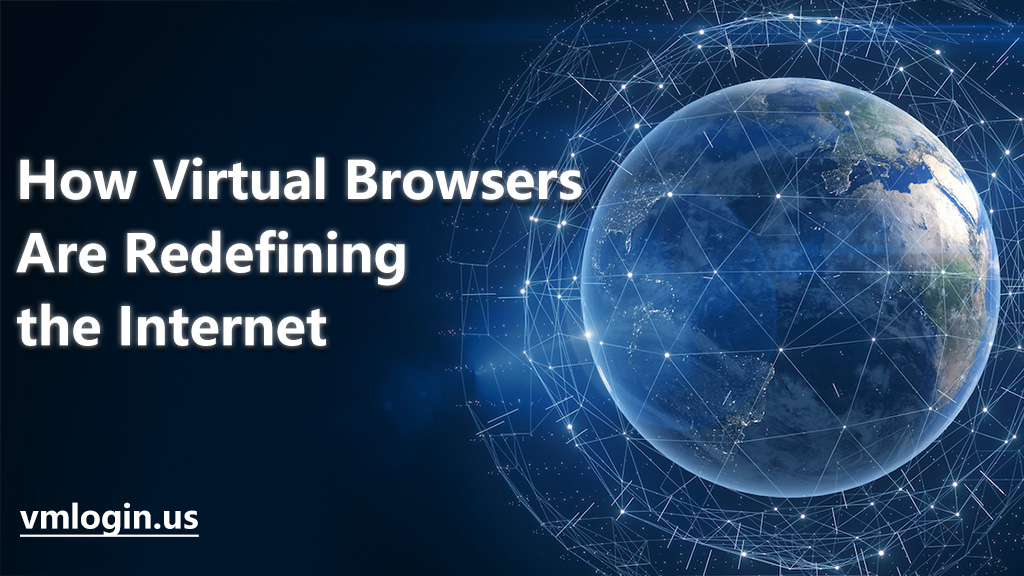Today, the Internet is an indispensable and ever-evolving part of our lives. As a result, the Internet has become more complex and diverse, with new technologies, services, and applications introduced daily. In this ever-changing landscape, virtual browsers have recently emerged as a revolutionary new way to access the Internet.
In short, a virtual browser is one that can provide multiple fingerprint settings, allowing multiple accounts to be opened simultaneously on a single computer without being associated. Each browser’s data is individually synchronized to the cloud in an encrypted form, allowing you to use that browser anytime, anywhere, no matter where you are and on which device you are logged in.
In addition, these search engines can be set up individually to set up separate networks for each browser, so that each browser will access each platform with a different IP. The impact of virtual browsers on the Internet is huge. That’s why companies quickly adopted these search engines to reap their advantages, such as increased productivity and cost savings.

Definition Of Virtual Browsers And How They Differ From Traditional Browsers
A virtual browser is a virtualized search engine that runs on a remote server rather than a user’s local computer. They are a form of cloud computing where a web browser is accessed as a service through a remote server.
How Virtual Browsers Differ From Traditional Browsers
Unlike traditional browsers, virtual browsers can control browser fingerprints, and users can set different fingerprint information for each browser, such as WEBRTC, User-Agent, resolution, language, WebGL, Canvas, computer name, Mac address and so on. The virtual browser can also set an independent IP for each browser. You can open multiple browsers at the same time and log in to multiple accounts on multiple platforms, and each account environment, cookies, etc. are independent of each other, so that the data is not leaked to each other, which can effectively ensure the security of each account. You can also protect your real computer environment and real IP address from being leaked and ensure the security and privacy of user data.
Five Things to Consider While Choosing A Virtual Web Browser
1. Fingerprint Control:
Users can set or add diverse browser fingerprints by themselves so that each browser fingerprint is independent of each other and not duplicated.
2. Performance:
Online virtual browser is fast and lag-free to use and supports superb API concurrency. Enables powerful automated repetitive workflows.
3. Security:
It is crucial to choose a browser that is secure and protects your privacy. Look for a browser with safe browsing, ad-blocking, and protection against malware and phishing attacks.
4. Customizability:
Look for a virtual browser online that allows you to customize your browsing experience, such as adding extensions or changing the browser’s appearance.
5. Support:
Get a browser with a good reputation for customer support and regularly updated with new features and security patches. It will ensure you have access to the latest and most reliable version.
Start your 3-day virtual browser online free trial today!
Top Features of a Reliable Virtual Browser
• Separate browser environment
• Multi-account logins without association
• Browser fingerprinting protection
• Build business workflows
• Develop web automation
• Enable team collaboration
• Professional technical support
Advantages of Virtual Browsers for Businesses And Consumers
Virtual browsers offer several advantages over traditional browsers for businesses and consumers.
Here are a few key benefits that virtual browsers provide:
1. Increased Security and Privacy:
Virtual web browsers provide a secure, private environment for all internet activities. They protect users’ sensitive data. Each browser is independently separated. Cookies, local storage and other cache files for each browser file will be completely isolated and browser profiles cannot leak information to each other.
2. Multiple fingerprint protection.
The VMLogin fingerprint browser allows websites to read a “masked fingerprint” that is different from your real fingerprint, replacing the old method of preventing websites from reading any fingerprint.
3. Multi-device data synchronization.
These search engines are more convenient than traditional browsers, users can use on multiple devices at the same time, and the data will be synchronized. There is no need to worry about the risk of blocking by platform detection due to multi-device login.
4. Reduced Costs:
Using virtual browser to facilitate business teamwork, which can save money and time for businesses.
5. Access to the Latest Technologies:
These browsers are often updated with the newest web technologies, so businesses and consumers can easily access the latest business platforms of any browser.
Additionally, it suitable for a wide enough range of industries. And users can access the browser on multiple devices.
How Virtual Browsers Are Revolutionizing the Way Businesses and Consumers Interact With the Internet
• Improved user experience
• Increased security of sensitive data
• Improved customer support
• Secured access to global markets
• Greater scalability
• Enhanced customer data privacy
The Bottom Line
In conclusion, virtual web browser is impacting the InternetInternet in unprecedented ways. By offering increased speed, privacy, and user-friendly functionality, they have helped to make the web experience more efficient, secure, and enjoyable.
One popular option for accessing a virtual browser online is VMLogin. So whether you’re looking for added security when browsing the web or want the convenience of using a virtual search engine from any device with an internet connection, it has you covered.
Visit here to get started VMLogin !


